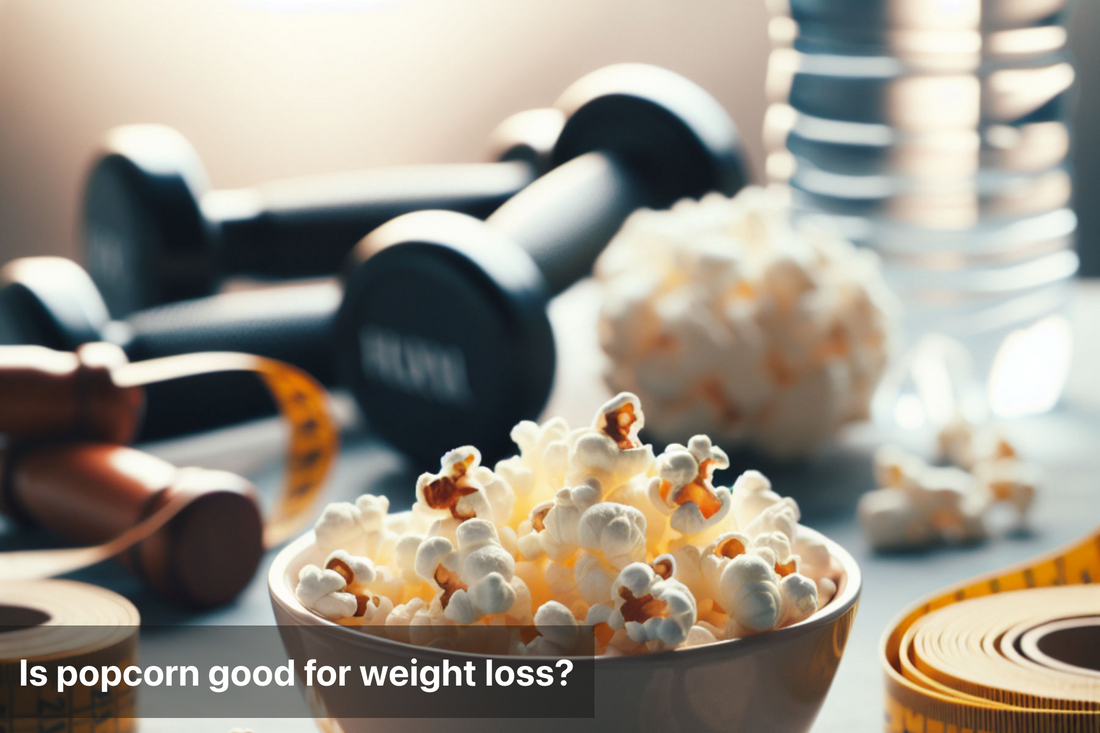
Is popcorn good for weight loss?
Share
Popcorn is a popular snack enjoyed by many around the world. Its light, airy texture makes it a favorite for movie nights and casual munching. As a whole grain, popcorn offers a satisfying crunch that can fill you up without a hefty calorie count. This is why it's often under consideration for those exploring healthy snacking options, particularly for those aiming to lose weight.
Despite its appeal, there is much debate about its suitability. Some health enthusiasts champion popcorn for its fiber content and relatively low calories, assuming it can satiate cravings without leading to weight gain. Others warn against potential downsides, especially when popcorn is seasoned with butter and salt, which can turn this seemingly healthy snack into a calorie bomb.
In this article, we will delve into the nutritional profile of popcorn, how it can be integrated into a weight loss plan, and the precautions that should be taken. By the end, you will have a clearer understanding of whether popcorn can genuinely support your weight loss journey or if moderation is key to enjoying it responsibly.
Nutritional Profile of Popcorn
Here’s the approximate nutritional breakdown for 1 cup (8 grams) of plain, air-popped popcorn:
Nutrient |
Amount per Serving (1 Cup) |
% Daily Value |
|---|---|---|
Calories |
31 kcal |
1% |
Carbohydrates |
6 grams |
2% |
Protein |
1 gram |
2% |
Fat |
0.4 grams |
1% |
Fiber |
1.2 grams |
5% |
Sodium |
0 mg |
0% |
Iron |
0.3 mg |
2% |
Health Coach Neha Singh (MSc - dietetics & food service management) suggests "Popcorn is proof that healthy snacking can be both satisfying and weight-loss friendly—when prepared the right way, it’s a guilt-free treat that fits your goals."
How Popcorn Fits into a Weight Loss Diet
Popcorn has many benefits that fits it to a weight loss diet.
Low in Calories
Air-popped popcorn is one of the lowest-calorie snacks available, with only 31 calories per cup. This allows you to enjoy a larger portion compared to other snacks without exceeding your calorie limit.High in Fiber
Popcorn is a whole grain, which means it’s rich in dietary fiber. Fiber helps you stay full for longer, reducing the chances of overeating.Low in Fat
When prepared without butter or oil, popcorn is naturally low in fat, making it a guilt-free snacking option.Promotes Satiety
Thanks to its volume and fiber content, popcorn can help curb hunger and prevent mindless snacking on less healthy options.Gluten-Free
Popcorn is naturally gluten-free, making it a safe snack for those with gluten sensitivities or celiac disease.Rich in Antioxidants
Popcorn contains polyphenols, antioxidants that help fight inflammation and support overall health.
Potential Downsides of Eating Popcorn
Popcorn, despite its potential benefits, does come with certain downsides that should be recognized, especially during a weight loss journey.
High in Calories When Prepared Unhealthily: Popcorn loaded with butter, oil, caramel, or cheese can significantly increase calorie intake, negating its weight-loss benefits.
Potential for Overeating: Its light and airy nature may lead to consuming large portions without realizing, which can result in excess calories.
High Sodium in Pre-Packaged Varieties: Many store-bought or microwavable popcorn options are high in sodium, potentially contributing to water retention and high blood pressure.
Additives and Preservatives: Flavored or pre-packaged popcorn often contains artificial additives, unhealthy trans fats, or preservatives, which can harm long-term health.
Digestive Discomfort: While high in fiber, consuming too much popcorn can cause bloating or discomfort in those with sensitive digestive systems.
Tips for Making Popcorn Weight-Loss Friendly
Tip |
Details |
|---|---|
Air-Pop Your Popcorn |
Use an air popper or stovetop method without oil to keep the calorie count low. |
Use Healthy Seasonings |
Flavor with spices like paprika, garlic powder, or nutritional yeast instead of butter or cheese. |
Limit Portion Sizes |
Stick to 2–3 cups per serving to avoid overeating. |
Add a Protein or Fiber Boost |
Pair with nuts, seeds, or a small serving of vegetables for a balanced, satisfying snack. |
Choose Plain Kernels |
Opt for plain popcorn kernels instead of pre-packaged microwave varieties to avoid additives. |
Minimize Added Oils |
If using oil, choose healthier options like olive oil or coconut oil and use it sparingly. |
Summary
Popcorn can be a valuable addition to a weight loss regimen if consumed mindfully. We've explored its nutritional benefits, specifically the low-calorie content and high fiber, which can promote satiety. This makes popcorn a great alternative to many traditional snacks that often contribute to higher caloric intake, leading to weight gain.
However, the way popcorn is prepared plays a critical role in its suitability for weight loss. Air-popped popcorn, sprinkled lightly with spices rather than drenched in butter and salt, can help maintain its health benefits. Portion control is essential, too. Although popcorn is low in calories, overindulging can compromise your weight loss goals.
It's important to remember that moderation is key. Including popcorn as a snack option can support your weight loss efforts, but it should complement an overall balanced diet filled with a variety of nutrients. Make smarter choices about popcorn, and it can definitely become part of your weight loss strategy.
FAQs
1. Can I eat popcorn every day for weight loss?
Yes, you can eat popcorn daily but stick to plain air-popped popcorn and limit your portion to avoid excessive calorie intake.
2. Is microwave popcorn good for weight loss?
Most microwave popcorn contains added butter, oil, and salt, which can be high in calories. Opt for air-popped popcorn instead.
3. How much popcorn can I eat while trying to lose weight?
Stick to 2–3 cups of air-popped popcorn per serving, which is around 90–100 calories.
4. Does popcorn make you gain weight?
Popcorn can lead to weight gain if consumed in large quantities or if topped with high-calorie ingredients like butter and caramel.
5. What is the healthiest way to eat popcorn?
The healthiest way is to air-pop popcorn and season it with low-calorie toppings like herbs, spices, or a light sprinkle of Parmesan cheese.


